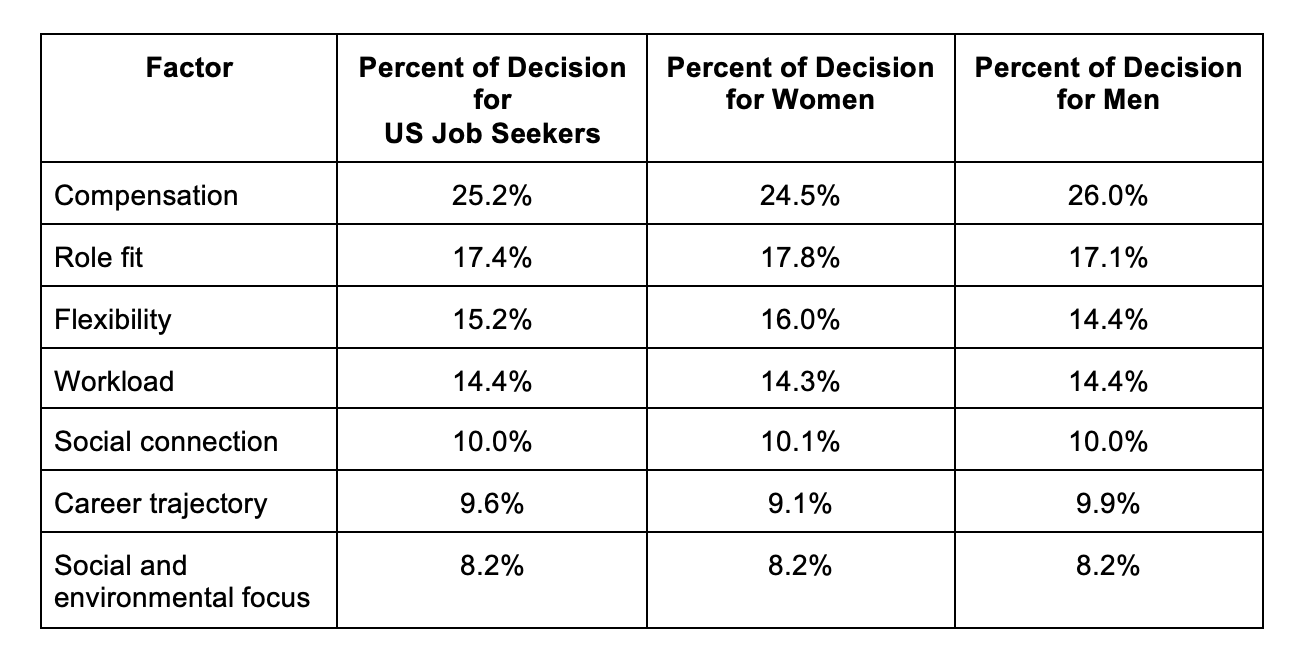Flexibility is Now a Deal-Breaker For Job Seekers
Last updated: October 6, 2022
Pay and role fit remain important, but the rise of remote work has elevated flexibility from a nice-to-have perk to a must-have expectation, according to a new Qualtrics report
PROVO, Utah & SEATTLE, Oct. 6, 2022– Flexibility is climbing the ranks of what matters to job seekers and is now one of the top three things they prioritize when considering a new role, along with compensation and job fit, according to a new Qualtrics (Nasdaq:XM) report. In a similar study in 2020, flexibility was among the least important, less of a priority than company values or being a fun place to work.
The findings illustrate how employee expectations have changed dramatically over the course of the pandemic as millions of workers experienced working from home – and how difficult those expectations would be to change.
Compensation is the top consideration of job seekers, and as more states introduce laws requiring employers to disclose pay ranges in job listings, it is easier for job seekers to quickly evaluate and compare opportunities. It’s also easy for current employees to know where their salary is within the range. The share of US workers who believe they are paid fairly for their work fell from 2020 to 2021.
Qualtrics determined this ranking using a “conjoint analysis.” Researchers asked respondents to choose between a series of scenarios, comparing two theoretical roles with various mixes of seven job factors. The analysis allowed Qualtrics to zero in on what is most important to job seekers in today’s competitive job market, and what they would be willing to give up. It also allowed researchers to simulate how different levels of job factors would impact the decisions of candidates.
For example, assume that a “dream job” is one that closely aligns with a candidate’s skills and interests and comes with great coworkers. A second job offer has an average role fit and coworkers, but a highly flexible work environment. If the “dream job” has at least some flexibility, 62% of candidates would pick it over the second offer. However, if the “dream job” has no flexibility, only 27% of candidates would choose it over the second offer.
Starting a family and taking care of loved ones elevated the importance of flexibility even more. Overall, flexibility in where and when work is done drives 15.2% of the decision, but that rises to 16.5% for people in their 30s and primary caregivers. Women also place a higher priority on flexibility than men do (16% versus 14.4%).
“The increased availability to choose when and where we work opened up opportunities for employees across the country, especially for those who have caretaking responsibilities or disabilities that make working in a traditional office more difficult to navigate,” said Qualtrics Chief Workplace Psychologist Dr. Benjamin Granger. “Employee expectations have increased, perhaps permanently, and offering at least some measure of flexibility may now be table stakes.”
For US job candidates, compensation carries the most weight in candidates’ decisions – about 25%. Along with a high salary, people also want a job that matches their skillset, gives them the flexibility to decide when and where they work, and has a balanced workload.
Social ties to coworkers, the ability to progress in a career and how focused the company is on social and environmental efforts carried the least weight, but should not be discounted. While more than half of employees say they would not even consider working at a company with values that don’t align with their own, 52% would be willing to take a pay cut for a job with matching values.

Methodology
This study was conducted as a conjoint analysis in August 2022. Respondents were selected from a randomized panel and considered eligible if they live in the United States, are at least 18 years of age and working full-time. The total number of respondents was 3,364. Respondents were shown a series of two job opportunities and selected which was more appealing to them. Each job opportunity had a high, medium or low level of: career trajectory, compensation, location and schedule flexibility, role fit, social and environmental focus, social connection, and workload.
About Qualtrics
Qualtrics, the leader and creator of the experience management category, is changing the way organizations manage and improve the four core experiences of business—customer, employee, product and brand. Over 16,750 organizations around the world use Qualtrics to listen, understand and take action on experience data (X-data™)—the beliefs, emotions and intentions that tell you why things are happening, and what to do about it. The Qualtrics XM Platform™ is a system of action that helps businesses attract customers who stay longer and buy more, engage employees who build a positive culture, develop breakthrough products people love and build a brand people are passionate about. To learn more, please visit qualtrics.com.